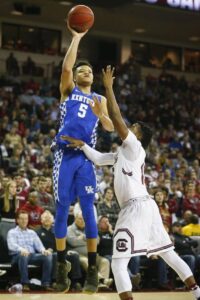by The Cowl Editor on March 1, 2018
Opinion

by Kevin Copp ’18
Opinion Staff
The FBI’s investigation into corruption in college basketball and its recently released findings have rattled the rim of one of the nation’s most popular sports. Many of the game’s most recognizable players have been found guilty of receiving improper benefits from agents during their respective recruitments. Some coaches and programs appear to have been aware of these benefits as well.
The timing of the FBI’s release of the results from their investigation is particularly damaging as the March Madness Tournament, the NCAA’s crown jewel, is scheduled to begin in only a few weeks. The NCAA has the authority to make a decision about whether to suspend players, coaches, or programs, and will need to act quickly to protect the integrity of the tournament. Although its decision will surely have significant financial ramifications for itself and its member institutions, the NCAA needs to keep any players and coaches who have knowingly broken recruiting rules out of the tournament to ensure that future recruits do not become pawns for NBA agents looking to make a buck.
It has long been suspected that recruiting in college basketball has involved under-the-table dealings that have permitted certain schools to gain an advantage in attracting the best players. Now the names of the top schools have come out. Traditional powerhouses like Michigan State, Kentucky, Duke, and North Carolina have had players who have potentially received “impermissible benefits.”
While this does not necessarily mean that coaches or athletic directors were aware of these improper payments (as the FBI report suggests two agents have been paying players so they would sign with their agency once they leave school), it raises questions as to whether some coaches did know and were working with agents to draw players to their schools.
The most pressing issue for the NCAA concerns the eligibility of current players who were named in the report. High-profile players at Alabama, Duke, Kentucky, and Michigan State—teams with strong possibilities of advancing deep into the NCAA tournament—have been named as receiving some form of inappropriate payments.
Although it might seem like financial suicide for the NCAA to keep those players (or even teams) out of the tournament, doing so would demonstrate the NCAA’s willingness to crack down on cheating and force teams and players to become compliant with the recruiting rules that have long been in place.
Keeping top players like Kevin Knox of Kentucky and Miles Bridges of Michigan State out of the tournament would show players that they will not be allowed to get a head start on their professional careers. Missing their sport’s most-watched event could drastically harm their draft status for the NBA and significantly reduce their future earnings.
Suspending coaches for the tournament would also force coaches to take control of their programs. If they are held accountable for the actions of their recruits and feel the heat of missing their team’s most important games of the season, they will be much more likely to play by the rules and run their program without risking further violations. Coaches know that their brand, their team, needs to be visible at the season’s most important time. Being suspended would be akin to a CEO missing his company’s most important board meeting.
The NCAA must take a hard stance on the corruption that has apparently been rampant throughout college basketball. Keeping implicated players and coaches out of basketball’s brightest spectacle, the NCAA tournament, would help clean up the sport and bring back a sense of amateurism to a game that has long been criticized for lacking it.